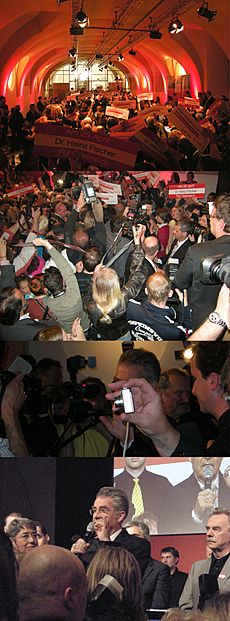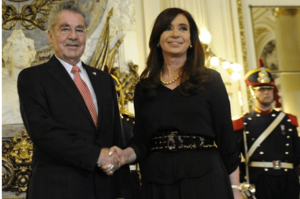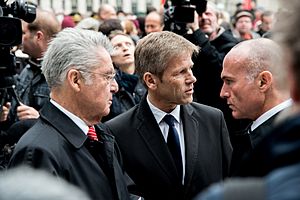Heinz Fischer facts for kids
Quick facts for kids
Heinz Fischer
|
|
|---|---|
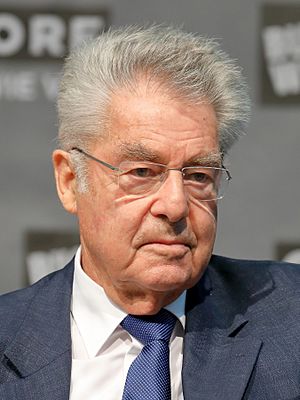
Fischer in 2018
|
|
| President of Austria | |
| In office 8 July 2004 – 8 July 2016 |
|
| Chancellor | |
| Preceded by | Thomas Klestil |
| Succeeded by | Alexander Van der Bellen |
| Second President of the National Council | |
| In office 20 December 2002 – 16 June 2004 |
|
| Preceded by | Thomas Prinzhorn |
| Succeeded by | Barbara Prammer |
| President of the National Council | |
| In office 5 November 1990 – 20 December 2002 |
|
| Preceded by | Rudolf Pöder |
| Succeeded by | Andreas Khol |
| Minister for Science and Research | |
| In office 24 May 1983 – 21 January 1987 |
|
| Chancellor | |
| Preceded by | Hertha Firnberg |
| Succeeded by | Hans Tuppy |
| Personal details | |
| Born | 9 October 1938 Graz, Reichsgau Steiermark, State of Austria, German Reich (now Graz, Styria, Austria) |
| Political party | Independent (2004–present) |
| Other political affiliations |
Social Democratic Party (until 2004) |
| Spouse |
Margit Binder
(m. 1968) |
| Children | 2 |
| Alma mater | University of Vienna (PhD) |
| Awards | Order of Merit of the Italian Republic Order of Prince Henry Royal Order of the Seraphim Military Order of Saint James of the Sword |
| Military service | |
| Allegiance | |
| Branch/service | |
| Years of service | 1958 |
| Unit | Heerestelegrafenbataillon Army Signal Corps |
Heinz Fischer is an important Austrian politician who was the President of Austria from 2004 to 2016. He was born on October 9, 1938. Before becoming president, he worked as a minister for science and was also the head of Austria's parliament, called the National Council. He was part of the Social Democratic Party of Austria (SPÖ) but stopped being a member when he became president.
Contents
Early Life and Education
Heinz Fischer was born in Graz, a city in Styria, Austria. This was shortly after Austria became part of Nazi Germany in 1938. He went to a high school that focused on subjects like history and literature.
After finishing school in 1956, he studied law at the University of Vienna. He earned his doctorate degree in 1961. Besides his political work, Fischer also had a career in academics. He became a professor of Political Science at the University of Innsbruck in 1994.
Political Journey
Fischer became a member of the Austrian parliament, the National Council, in 1971. He served as its president, or speaker, from 1990 to 2002. From 1983 to 1987, he was the minister for science. This was part of a government led by Fred Sinowatz.
Becoming President
In January 2004, Heinz Fischer announced he would run for president. He wanted to take over from the previous president, Thomas Klestil. On April 25, 2004, he was elected as president. He was the candidate for the Social Democratic Party.
Fischer won with 52.4 percent of the votes. He defeated Benita Ferrero-Waldner, who was the foreign minister at the time. Fischer officially became president on July 8, 2004.
Second Term as President


In April 2010, Fischer was re-elected for his second six-year term as president of Austria. He won with almost 79% of the votes. However, not many people voted in this election. Only about 53.6% of eligible voters participated.
This low voter turnout was unusual. One reason might have been that polls predicted Fischer would easily win. Also, the other major party, the ÖVP, did not put forward their own candidate. Some of their members even suggested people cast a blank vote.
After Presidency
After his time as president ended in 2016, Fischer continued to be involved in global issues. In 2017, he helped start the Ban Ki-Moon Centre for Global Citizens. He co-founded this organization with former UN Secretary-General Ban Ki-moon. The center is based in Vienna and works to help achieve the Sustainable Development Goals around the world.
Personal Life
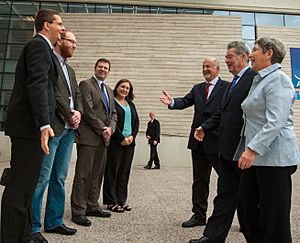
Heinz Fischer describes himself as agnostic, meaning he doesn't claim to know if God exists. He also identifies as a social democrat, which is a political belief focused on social justice and equality. He married Margit Binder in 1968, and they have two adult children.
Fischer enjoys mountaineering and has been the president of the Austrian Friends of Nature for many years.
Awards and Recognition
Heinz Fischer has received many awards and honors from Austria and other countries for his public service.
- In 2004, he received the Grand Star of Honour of the Decoration of Honour for Services to the Republic of Austria. This is a very high honor in Austria.
- He also received the Ring of Honour from the Province of Styria and the Freedom of the City of Graz in 2008.
- From other countries, he has received important awards like the Grand Collar of the Order of Prince Henry from Portugal and the Knight Grand Cross of the Order of Merit of the Italian Republic from Italy.
See also
 In Spanish: Heinz Fischer para niños
In Spanish: Heinz Fischer para niños
- List of national leaders
- Politics of Austria
 | Calvin Brent |
 | Walter T. Bailey |
 | Martha Cassell Thompson |
 | Alberta Jeannette Cassell |


